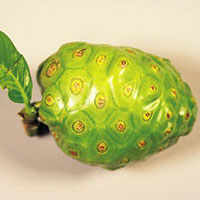Search Healthnotes
Noni
 © Martin Wall
© Martin WallHow It Works
The major constituents in noni appear to be polysaccharides and a compound known as damnacanthal.1, 2, 3 The developer of a commercial noni product claims the alkaloid xeronine is an important constituent, but there has been no confirmation by independent researchers. Animal and test tubes studies show noni to have immune-enhancing activity, and an earlier animal study seemed to indicate the fruit exerts a mild sedative effect.4, 5, 6 Specifically, the polysaccharide component has been shown to increase the release of immune-enhancing compounds that activate white blood cells. Also, damnacanthal is thought to be responsible for producing sedative effects in animal studies.
How to Use It
The usual recommendation is 4 ounces (120 ml) of noni juice 30 minutes before breakfast (effectiveness is thought to be best on an empty stomach). Commercial products are now available that have either eliminated the odor, altered the taste, or made it available as an extract in tablets or capsules to increase palatability. For liquid concentrates the typical recommendation is 2 tablespoons (30 ml) per day. For powdered extracts the typical recommendation is 500 to 1,000 mg daily.
Copyright © 2026 TraceGains, Inc. All rights reserved.
Learn more about TraceGains, the company.
The information presented by TraceGains is for informational purposes only. It is based on scientific studies (human, animal, or in vitro), clinical experience, or traditional usage as cited in each article. The results reported may not necessarily occur in all individuals. Self-treatment is not recommended for life-threatening conditions that require medical treatment under a doctor's care. For many of the conditions discussed, treatment with prescription or over the counter medication is also available. Consult your doctor, practitioner, and/or pharmacist for any health problem and before using any supplements or before making any changes in prescribed medications. Information expires December 2026.










